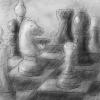Recently I studied some cognitive psychology and it gave me a lot of new interesting insights and terminology that I can use in game design. I had a similar revelation when studying graphical design many years ago. I don't plan a career in game production, but I would still like to increase my knowledge in game-design vocabulary & terminology.
Those of you who have a more formal education and/or working in the industry; do you have any suggestions of good books or other sources for terminology?
Reading some random tutorials works, but I would like something more concise authoritative(?), e.g. something that can be considered a standard.









